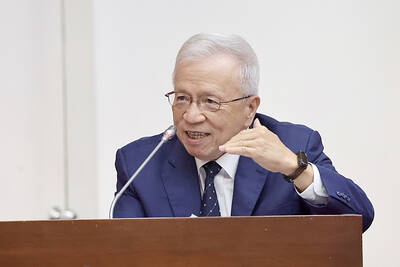Asustek Computer Inc (華碩電腦) recalled units of its newly launched desktop, the EeeBox, from Japan on Saturday, after reports of computer virus infection.
The recall covers the 300 units sold in Japan since the EeeBox was launched on Oct. 3, marketing department publicist Beck Lee (李育陞) said by telephone yesterday.
However, “the first batch of 1,000 units shipped to Japan that haven’t been sold have also been recalled as a precautionary measure,” Lee said.
The company will make a formal announcement at a later date, he said.
Asustek said the virus problem was only in the software on EeeBox units shipped to Japan, and does not affect shipments of the desktop to other Asia-Pacific countries. A preliminary investigation showed the virus could have come from the company’s Japanese-language software assembly line, Lee said.
Japanese consumers have reported finding encrypted texts on their EeeBox computers.
Lee said Asustek’s EeeTop desktops were not affected by the virus.
The EeeTop is a step up from the EeeBox and features touch screens and stylish keyboards. The company sold more than 100,000 EeeTop units worldwide in August and last month.
“Since EeeTop runs on completely different software, it is not affected at all by this virus scare,” Lee said.

JITTERS: Nexperia has a 20 percent market share for chips powering simpler features such as window controls, and changing supply chains could take years European carmakers are looking into ways to scratch components made with parts from China, spooked by deepening geopolitical spats playing out through chipmaker Nexperia BV and Beijing’s export controls on rare earths. To protect operations from trade ructions, several automakers are pushing major suppliers to find permanent alternatives to Chinese semiconductors, people familiar with the matter said. The industry is considering broader changes to its supply chain to adapt to shifting geopolitics, Europe’s main suppliers lobby CLEPA head Matthias Zink said. “We had some indications already — questions like: ‘How can you supply me without this dependency on China?’” Zink, who also

At least US$50 million for the freedom of an Emirati sheikh: That is the king’s ransom paid two weeks ago to militants linked to al-Qaeda who are pushing to topple the Malian government and impose Islamic law. Alongside a crippling fuel blockade, the Group for the Support of Islam and Muslims (JNIM) has made kidnapping wealthy foreigners for a ransom a pillar of its strategy of “economic jihad.” Its goal: Oust the junta, which has struggled to contain Mali’s decade-long insurgency since taking power following back-to-back coups in 2020 and 2021, by scaring away investors and paralyzing the west African country’s economy.

BUST FEARS: While a KMT legislator asked if an AI bubble could affect Taiwan, the DGBAS minister said the sector appears on track to continue growing The local property market has cooled down moderately following a series of credit control measures designed to contain speculation, the central bank said yesterday, while remaining tight-lipped about potential rule relaxations. Lawmakers in a meeting of the legislature’s Finance Committee voiced concerns to central bank officials that the credit control measures have adversely affected the government’s tax income and small and medium-sized property developers, with limited positive effects. Housing prices have been climbing since 2016, even when the central bank imposed its first set of control measures in 2020, Chinese Nationalist Party (KMT) Legislator Lo Ting-wei (羅廷瑋) said. “Since the second half of

AI BOOST: Next year, the cloud and networking product business is expected to remain a key revenue pillar for the company, Hon Hai chairman Young Liu said Manufacturing giant Hon Hai Precision Industry Co (鴻海精密) yesterday posted its best third-quarter profit in the company’s history, backed by strong demand for artificial intelligence (AI) servers. Net profit expanded 17 percent annually to NT$57.67 billion (US$1.86 billion) from NT$44.36 billion, the company said. On a quarterly basis, net profit soared 30 percent from NT$44.36 billion, it said. Hon Hai, which is Apple Inc’s primary iPhone assembler and makes servers powered by Nvidia Corp’s AI accelerators, said earnings per share expanded to NT$4.15 from NT$3.55 a year earlier and NT$3.19 in the second quarter. Gross margin improved to 6.35 percent,